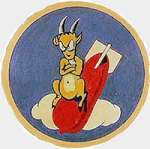Air Force 1 AF10110A USAAF Boeing B-17G-30-BO Flying Fortress Heavy Bomber - "Nine-O-Nine", 323rd Bomb Squadron, 91st Bomb Group, Bassingbourn, England, 1944 (1:72 Scale)
"Why, it's a flying fortress!"
- Richard Williams, reporter for the Seattle Times, upon seeing a B-17 heavy bomber for the first time
 The B-17, arguably World War II's most famous heavy bomber, first flew on July 28th, 1935, before a crowd of reporters eager to see Boeing's new bomber take wing. It was dubbed the "Flying Fortress" by the members of the press in attendance because of its (at least for the time) heavy defensive armament. The prototype crashed in October, but because of its impressive speed and handling the US Army Air Corps (USAAC) decided to continue testing anyway. They ordered 13 YB-17s for further evaluation, a decision that would prove momentous in years to come.
The B-17, arguably World War II's most famous heavy bomber, first flew on July 28th, 1935, before a crowd of reporters eager to see Boeing's new bomber take wing. It was dubbed the "Flying Fortress" by the members of the press in attendance because of its (at least for the time) heavy defensive armament. The prototype crashed in October, but because of its impressive speed and handling the US Army Air Corps (USAAC) decided to continue testing anyway. They ordered 13 YB-17s for further evaluation, a decision that would prove momentous in years to come.
The YB-17 had five machine guns, room for 4,800 pounds of bombs and a crew of nine. It had electrically retractable landing gear. After testing the YB-17, an improved prototype, the Y1B-17, was built with Wright Cyclone radial engines. Twelve were delivered to the USAAC's 2nd Bombardment Group for trials. One of these was soon equipped with new Moss/General Electric turbochargers that became standard on all future Flying Fortresses. The first production order was for 39 B-17Bs with turbo-charged engines, and as soon as these were under production another order for the B-17C was placed, with seven machine guns instead of the original five.
The RAF received their first B-17Cs in 1941, and were soon conducting daylight raids over Germany. The defensive armament soon proved inadequate, and the B-17's altitude was little defense against the German fighters. Orders for the B-17D were soon placed with self-sealing fuel tanks and more armor because of lessons learned in bombing missions over Europe. The B-17E and B-17F soon followed with larger tail. The B-17F was the first to serve with the USAAF 8th Air Force. After suffering staggering losses in late 1943, analysis proved head-on attacks by enemy fighters were a distinct problem. The final major version, the B-17G, added a chin turret with dual machineguns. This gave the B-17 a defensive armament of 13 guns.
After the war, several dozen B-17s lived on as fire-bombers and aerial surveyors until the last one was retired in the 1970s. Today, a few B-17s have been restored to their wartime splendor. Ten are currently flying in the United States, one in the UK and another one in France.
Pictured here is a 1:72 scale replica of a USAAF Boeing B-17G-30-BO Flying Fortress heavy bomber nicknamed "Nine-O-Nine", which was attached to the 323rd Bomb Squadron, 91st Bomb Group, then deployed to Bassingbourn, England, during 1944.
Sold Out!
Dimensions:
Wingspan: 17-1/4-inches
Length: 12-1/4-inches
Release Date: February 2017
 Historical Account: "Nine-O-Nine" - "Nine-O-Nine" was a Boeing B-17G-30-BO Flying Fortress heavy bomber, of the 323rd Bomb Squadron, 91st Bomb Group, that completed 140 combat missions during World War II, believed to be the Eighth Air Force record for most missions, without loss to the crews that flew it.
Historical Account: "Nine-O-Nine" - "Nine-O-Nine" was a Boeing B-17G-30-BO Flying Fortress heavy bomber, of the 323rd Bomb Squadron, 91st Bomb Group, that completed 140 combat missions during World War II, believed to be the Eighth Air Force record for most missions, without loss to the crews that flew it.
The original aircraft, a block 30 B-17G manufactured by Boeing, was nicknamed after the last three digits of her serial number: 42-31909. Nine-0-Nine was added to the USAAF inventory on December 15th, 1943, and flown overseas on February 5th, 1944. After depot modifications, she was delivered to the 91st BG at RAF Bassingbourn, England, on February 24th, 1944, as a replacement aircraft, one of the last B-17s received in factory-applied camouflage paint.
A former navigator of the 91st BG, Marion Havelaar, reported in his history of the group that Nine-O-Nine completed either 126 or 132 consecutive missions without aborting for mechanical reasons, also believed to be a record. M/Sgt. Rollin L. Davis, maintenance line chief of the bomber, received the Bronze Star for his role in achieving the record.
Her first bombing raid was on Augsburg, Germany, on February 25th, 1944. She made 18 bombing raids on Berlin. In all she flew 1,129 hours and dropped 562,000 pounds of bombs. She had 21 engine changes, four wing panel changes, 15 main gas tank changes, and 18 changes of Tokyo tanks (long-range fuel tanks).
After the hostilities ceased in Europe, Nine-O-Nine was returned to the United States on June 8th, 1945, and was consigned to the RFC facility at Kingman, Arizona on December 7th, 1945, and eventually scrapped.





 B-17G Flying Fortress "Nine-O-Nine"
B-17G Flying Fortress "Nine-O-Nine" 


